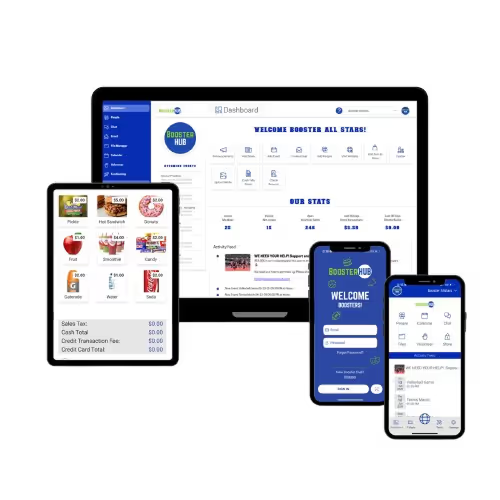
Why Your Booster Club Should Have a System of Record
As a booster club leader, you've probably experienced the familiar challenge: a dedicated volunteer steps down, and suddenly you're scrambling to piece together crucial information about fundraising campaigns, donor contacts, or financial records. What if there was a way to ensure your club's institutional knowledge never walks out the door with departing volunteers?
If you've been involved with booster clubs for a while, you might remember the days when the system of record was a thick three-ring binder, ceremoniously passed from one booster leader to the next like a sacred torch. That binder contained everything – handwritten contact lists, photocopied receipts, and detailed notes about "what worked last year." Then came the digital revolution: Dropbox folders, Google Sheets, and shared drives that promised to make everything more organized and accessible.
And it worked... until someone graduated, moved away, or simply forgot their password, effectively locking everyone else out of years' worth of institutional knowledge. Sound familiar?
The answer lies in establishing a robust system of record – a centralized, organized approach to documenting and maintaining all your booster club's essential information that doesn't depend on any single person's account access. Far more than just keeping good records, a proper system of record becomes the backbone of a successful, sustainable booster club operation.
Institutional Memory That Outlasts Volunteer Turnover
Volunteers come and go, but a system of record keeps the information.
Every booster club faces the reality of volunteer turnover. Parents graduate with their children, life circumstances change, and dedicated leaders move on. When this happens, clubs often lose invaluable institutional knowledge – the contact information for that reliable vendor, the details of successful fundraising strategies, or the history of what works (and what doesn't) for your specific program.
A comprehensive system of record captures this knowledge in a way that transcends individual volunteers:
- Contact databases that maintain relationships with donors, vendors, and community partners
- Event documentation that records what made fundraisers successful or unsuccessful
- Process documentation that explains how recurring activities should be handled
- Financial history that provides context for budgeting and planning decisions
When new volunteers step into leadership roles, they inherit not just responsibilities, but the collective wisdom of those who came before them. This continuity transforms a club from starting over each year to building upon a foundation of experience.
Data-Driven Decision Making Through Benchmarking
Set benchmarks for your program.
Successful booster clubs don't operate on gut feelings – they make informed decisions based on historical data and clear performance metrics. A system of record enables you to establish and track meaningful benchmarks that guide your club's strategic direction.
Consider these valuable benchmarks your system can help you establish:
- Fundraising performance: Track revenue by event type, season, and year to identify your most effective fundraising activities
- Volunteer engagement: Monitor participation rates to understand which activities generate the most volunteer support
- Expense ratios: Calculate what percentage of funds goes directly to your program versus administrative costs
- Community reach: Measure growth in your donor base and community involvement over time
With this data at your fingertips, you can answer critical questions: Are your spring fundraisers consistently more successful than fall events? Which volunteer recruitment strategies yield the most committed long-term helpers? How has your cost per dollar raised changed over the years?
These insights empower your leadership team to allocate resources more effectively, set realistic goals, and demonstrate the club's impact to stakeholders.
Staying Compliant in an Increasingly Complex Regulatory Environment
Comply with tax and regulatory items, and sales tax.
Booster clubs operate in a complex web of tax and regulatory requirements that continue to evolve. From maintaining nonprofit status to properly handling sales tax on merchandise, compliance isn't optional – and the consequences of getting it wrong can be severe.
A proper system of record ensures you're prepared for compliance requirements:
Tax Documentation: Maintain detailed records of income, expenses, and activities that support your tax-exempt status. Document that funds are being used for their intended educational or charitable purposes.
Sales Tax Management: Track which sales activities require tax collection in your state, maintain proper documentation of tax collected and remitted, and ensure you're registered in all jurisdictions where you conduct business.
Financial Reporting: Generate the financial statements and documentation required for annual filings, board reports, and any audits or reviews.
Donor Records: Maintain proper documentation for donation acknowledgments and ensure compliance with IRS requirements for charitable contributions.
Activity Documentation: Keep records that demonstrate your activities align with your stated nonprofit mission and purposes.
When tax season arrives or regulatory questions arise, you'll have the documentation readily available rather than scrambling to reconstruct records from scattered sources.
Building a Fraud-Resistant Operation
Prevent Fraud.
While we'd like to think fraud never happens in volunteer organizations, the reality is that booster clubs handle significant amounts of money with often-minimal oversight. A robust system of record creates natural safeguards that protect both your funds and your volunteers from accusations or temptation.
Key fraud prevention elements include:
Clear audit trails that document who handled money, when transactions occurred, and what approvals were obtained. When every financial transaction is logged and traceable, irregularities become immediately apparent.
Separation of duties documentation that shows different people are responsible for collecting money, depositing funds, and reconciling accounts. Your system should make it easy to verify these protocols are being followed.
Regular reconciliation processes that compare multiple records (bank statements, cash counts, deposit slips) to identify discrepancies quickly.
Approval workflows that require multiple people to sign off on expenditures above certain thresholds.
Access controls that limit who can modify financial records and maintain a log of all changes.
Beyond protecting your club's assets, these safeguards protect volunteers from unfair suspicion. When money goes missing and there's no clear documentation, even honest volunteers can find themselves under a cloud of suspicion. A comprehensive system of record protects everyone involved.
Amplifying Your Impact: Better Fundraising and Volunteer Recruitment
Raise more money and rally more volunteers for your program.
Perhaps the most compelling reason to establish a system of record is its power to amplify your club's effectiveness. When you have organized, accessible information about your operations, you can raise more money and attract more volunteers.
Enhanced Fundraising Capabilities:
- Donor relationship management: Track giving history, preferences, and contact information to personalize your outreach and improve donor retention
- Campaign analysis: Identify which messages, timing, and approaches generate the best response rates
- Corporate partnerships: Maintain detailed records of business relationships, sponsorship levels, and renewal dates
- Grant opportunities: Keep organized records that make grant applications faster and more professional
Improved Volunteer Recruitment and Retention:
- Skills inventory: Track volunteer capabilities and interests to match people with appropriate opportunities
- Recognition tracking: Ensure consistent acknowledgment of volunteer contributions
- Communication efficiency: Maintain updated contact lists for targeted outreach to specific volunteer groups
- Onboarding optimization: Use documented processes to get new volunteers productive quickly
Professional Credibility:
When potential donors, school administrators, or community partners see that your booster club operates with organized systems and professional documentation, they're more likely to trust you with larger commitments. Your system of record becomes a competitive advantage in building relationships and securing support.
Modern Solutions: Purpose-Built Systems for Booster Clubs
While you could attempt to cobble together a system using various generic tools, purpose-built platforms designed specifically for booster clubs offer significant advantages. BoosterHub represents one of the most powerful system of record solutions available to booster clubs today, addressing the exact pain points outlined above.
What makes BoosterHub particularly effective as a system of record:
Seamless Leadership Transitions: Unlike personal Dropbox accounts or Google Sheets tied to individual volunteers, BoosterHub features transitional master admin capabilities. When leadership changes, access and administrative rights can be smoothly transferred without losing any historical data or creating access disruptions.
Appropriate Access Controls: Not everyone needs access to everything. BoosterHub provides varied levels of access permissions, ensuring volunteers can access the information they need for their roles while protecting sensitive financial and donor information.
Transparency with School Partners: School administrators can be granted "read-only" access to relevant information, fostering trust and collaboration while maintaining your club's operational independence. This transparency often strengthens relationships with school leadership and demonstrates your commitment to accountability.
Built-in Longevity: Perhaps most importantly, BoosterHub ensures the longevity of your booster club by creating a permanent institutional foundation that survives volunteer turnover, technology changes, and the inevitable challenges that cause many clubs to struggle or dissolve.
Getting Started: Building Your System of Record
Whether you choose a specialized platform like BoosterHub or build your own system using existing tools, the key is starting with your most critical needs:
- Financial records: Ensure every transaction is documented with appropriate detail and supporting documentation
- Contact management: Centralize all donor, volunteer, and vendor contact information
- Process documentation: Write down the steps for your most important recurring activities
- Access management: Establish clear protocols for who can access what information and how transitions will be handled
Remember, the best system is one that gets used consistently. Choose tools and processes that match your club's technical comfort level and volunteer capacity, while ensuring they can grow with your organization.
The Investment That Pays Dividends
Establishing a system of record requires an upfront investment of time and effort, but it pays dividends in multiple ways: reduced stress for leadership, better financial outcomes, improved compliance, and most importantly, a stronger program that can weather volunteer transitions and grow over time.
Your students deserve a booster club that operates at its full potential. A comprehensive system of record isn't just good practice – it's the foundation that transforms good intentions into lasting impact.
Ready to strengthen your booster club's operations? Explore more resources for volunteer-driven organizations at BoosterHub.com, where we help booster clubs build systems that work.
Simplify Communications from App to Website


Take Control of Your Booster Club Spending with Debit Cards


.avif)